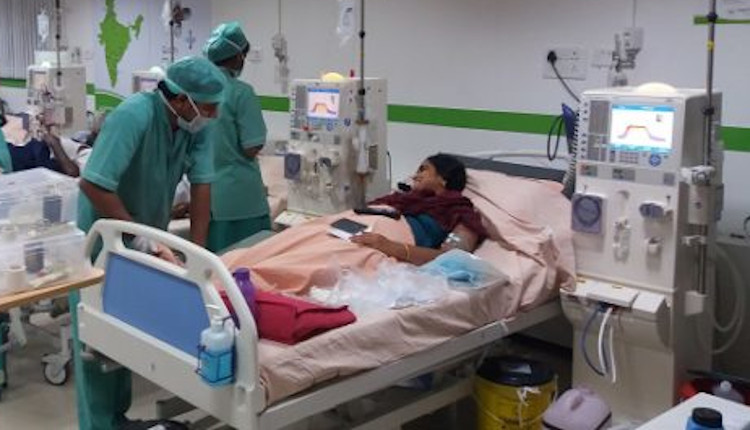
Infection Prevention and Control in dialysis units. What do the IPC guidelines of the Government of India state?
Infections in dialysis units are frequent and, in India, they are the second cause of death in HD (haemodialysis) patients. In this article, we are going to analyze the Indian National Guidelines for Infection Prevention and Control (IPC) in Healthcare Facilities 2020 report.
Haemodialysis patients are more exposed to infections of different types, now there is also the danger of COVID-19. Among the most common infections, they could detect BSI (Bloodstream Infection), vascular access’s localized infections, blood-borne ones (like HIV) and airborne infections (tuberculosis, for example). So, what are the precautions to increase IPC (Infection Prevention and Control) in healthcare facilities of India?
The 2020 guidelines for IPC in India, medical professionals who guarantee protection in dialysis units
Dialysis units saw many infections outbreaks which have often been due to poor infection control practices. According to researches conducted by the Ministry of Health and Family Welfare of India, infections could arrive from contaminated water, equipment and surfaces in treatment areas. That is why, a new IPC programme in HD units is so important, especially in times of COVID-19.
IPC activities carried out by medical staff like doctors and nurses have the aim to reduce the risk of infection for patients. In particular, the new guidelines specify that in each dialysis unit, a doctor or a senior nurse should be given the duty to supervise the IPC activities and manage all that goes around them. His/her role includes:
- Monitoring of IPC practices
- Training of new staff and ongoing training of all staff 116 National Guidelines for Infection Prevention and Control in Healthcare Facilities
- Periodic surveillance to assess risk
- Implementation of preventive bundles
It is very important that this professional communicates and networks with the IPC team like nurses, technicians, physicians, housekeeping staff, and also the patient and his/her family. The clarity of every single role among medical staff is important to prevent infections in an HD patient.
Measures to reduce risks of infection in HD patients by the new IPC guidelines in India
Contact transmission is the main cause of infection in HD patient. It occurs via hands, contaminated with infected blood directly or indirectly from contaminated surfaces and equipment. The Ministry of Health of India followed the indications of the World Health Organization in terms of Hospital Preparedness for Epidemics (the official document link at the end of the article).
The use of single-use gloves, disposable plastic aprons or gown, mask are standard precautions that must always be followed every day with patients. This is to prevent contact with blood, secretions, excretions or contaminated items. In case a patient has been identified with an airborne illness should be masked immediately and separated from other patients in a single room which is preferably under negative pressure.
Patients and staff should be vaccinated as per the recommendations of the national immunization programme, and the patient and nurse must wear a mask when a catheter is connected or disconnected from the bloodlines during the dialysis process.
How to properly clean equipment and surfaces to provide a correct IPC in dialysis units?
The main role in infection prevention and control (IPC) in the HD unit is the environmental and equipment cleaning. On this topic, the Ministry of Health and Family Welfare of India dedicated a specific annex (the link at the end of the article).
It is very important to clean and disinfect surfaces in the patient zone (chair, armrests, bedside tabletop/counter, and drawer/ cupboard handles) and high touch surfaces (the exterior surfaces of the dialysis unit machine, computer screens, and keyboards) between every patient treatment. Mandatory is to provide a correct cleaning and to take enough time on this, in order to avoid to leave a single part uncleaned.
Dialysis unit equipment must be properly cleaned as well, including
- HD machines
- dialysers
- water supply/treatment/distribution systems
- component parts such as tubing and filters
- acid and bicarbonate concentrate solutions
- and instruments including blood pressure cuff
- stethoscope
- haemostats
- scissors
- clamps
Regarding equipment cleaning, the Indian Ministry of Health 2020 guidelines strictly recommend following the manufacturer instructions.
YOU COULD FIND INTERESTING ALSO
How to decontaminate and clean the ambulance properly?
Japan launched rapid antigen test kits to detect coronavirus infections
COVID-19 in Kosovo, the Italian Army sanitizes 50 buildings and AICS donates PPEs
SOURCE
India National Guidelines for Infection Prevention and Control (IPC) in Healthcare Facilities 2020
REFERENCES
WHO, Hospital Preparedness for Epidemics
WHO infection prevention and control core components summary


